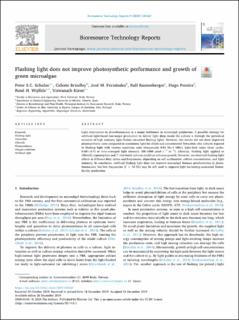Flashing light does not improve photosynthetic performance and growth of green microalgae
Schulze, Peter Simon Claus; Brindley, Celeste; Fernández, José M.; Rautenberger, Ralf; Pereira, Hugo; Wijffels, Rene Hubertus; Kiron, Viswanath
Peer reviewed, Journal article
Published version

View/
Date
2020Metadata
Show full item recordCollections
Original version
Schulze, P. S. C., Brindley, C., Fernandez, J. M., Rautenberger, R., Pereira, H., Wijffels, R. H. & Viswanath, K. (2020). Flashing light does not improve photosynthetic performance and growth of green microalgae. Bioresource Technology Reports, 9: 100367. doi: 10.1016/j.biteb.2019.100367Abstract
Light attenuation in photobioreactors is a major bottleneck in microalgal production. A possible strategy for artificial light-based microalgal production to deliver light deep inside the culture is through the periodical emission of high intensity light flashes (so-called flashing light). However, our results did not show improved photosynthetic rates compared to continuous light for dilute and concentrated Tetraselmis chui cultures exposed to flashing light with various repetition rates (frequencies 0.01 Hz–1 MHz), light-dark ratios (duty cycles: 0.001–0.7) or time-averaged light intensity (50–1000 μmol s−1 m−2). Likewise, flashing light applied to Chlorella stigmatophora and T. chui batch cultures could not enhance growth. However, we observed flashing light effects at different duty cycles and frequencies, depending on cell acclimation, culture concentration, and light intensity. In conclusion, artificial flashing light does not improve microalgal biomass productivities in photobioreactors, but low frequencies (f < 50 Hz) may be still used to improve light harvesting-associated biomolecules production.
